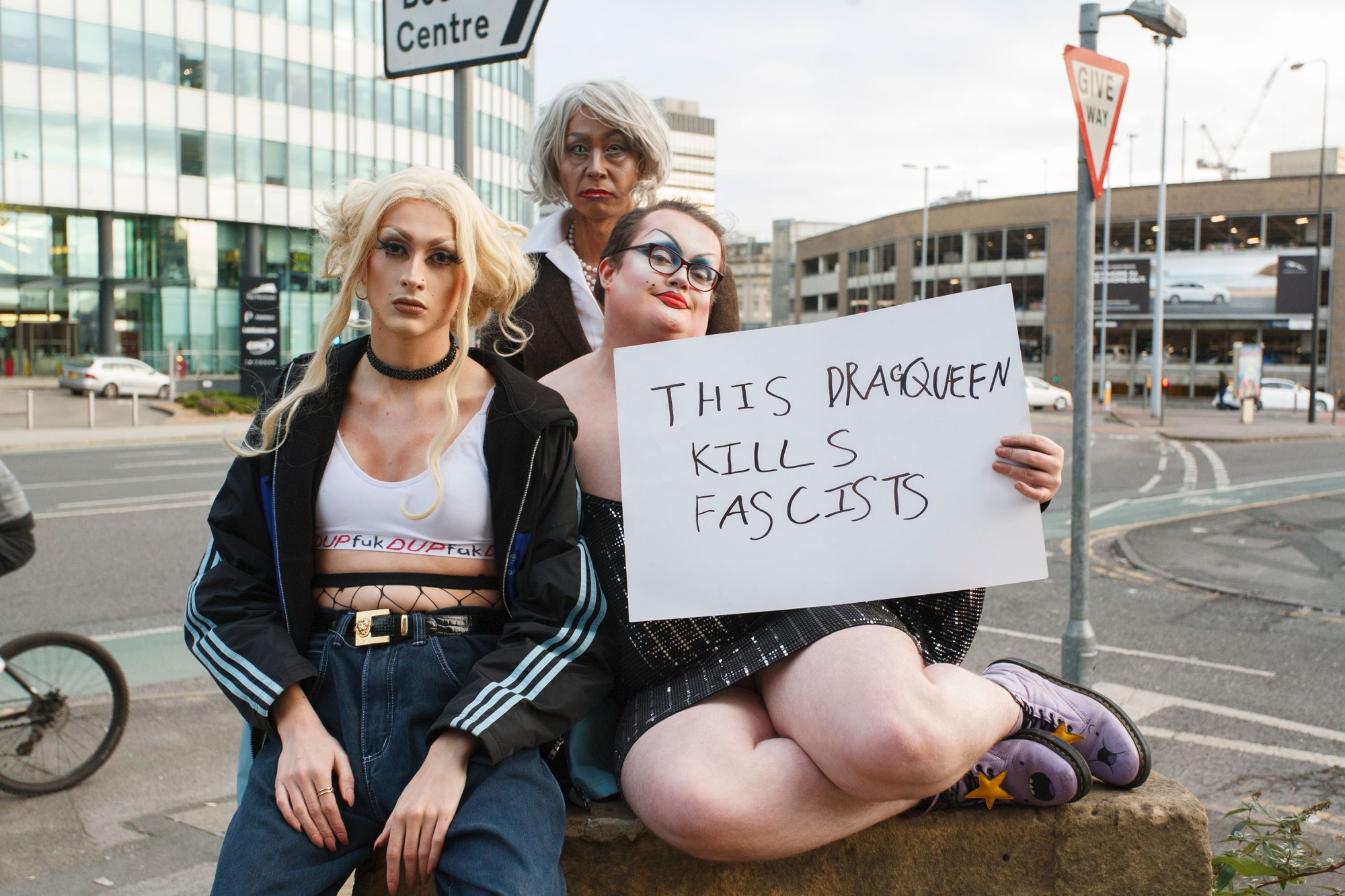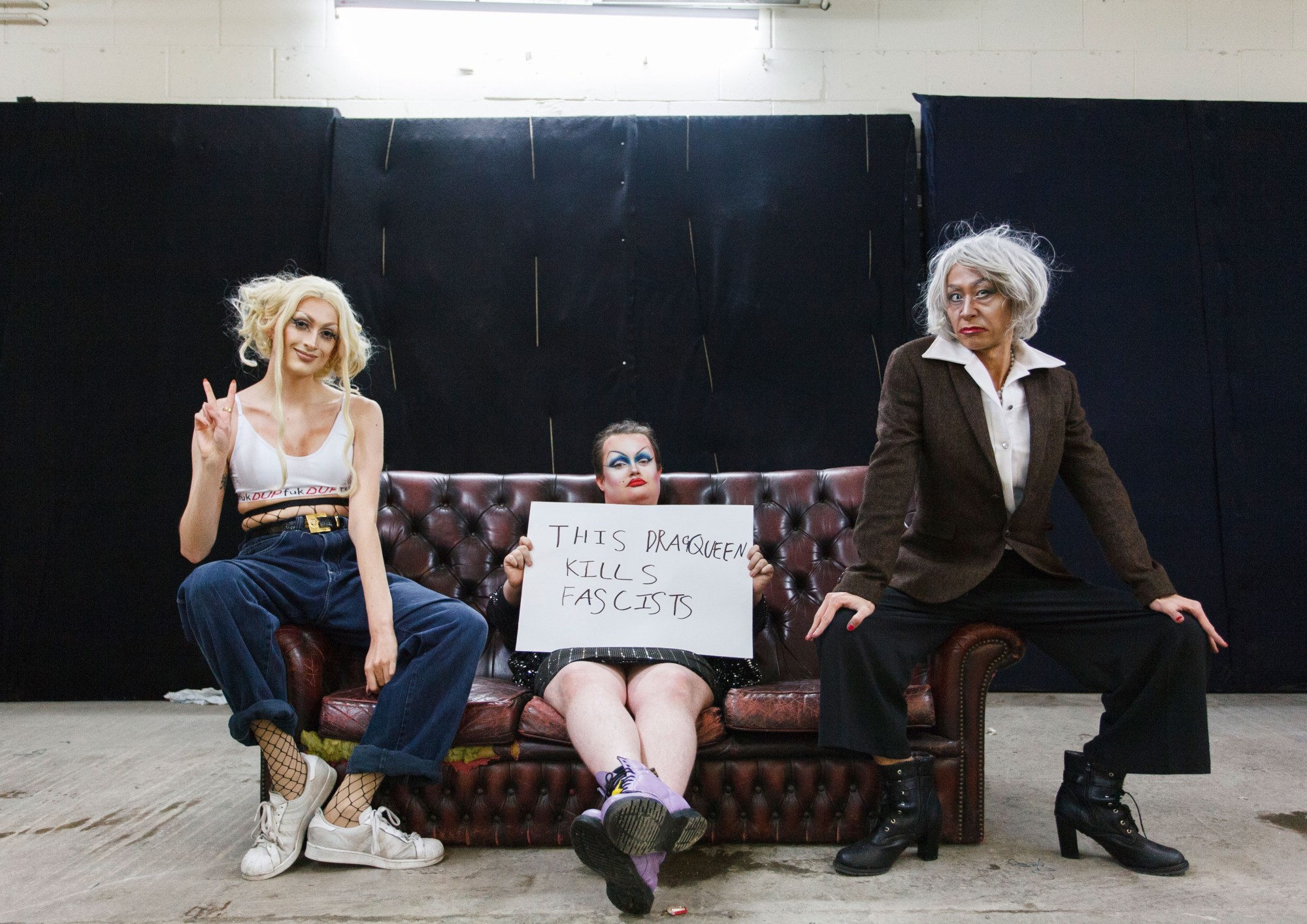In fearful times of austerity, Brexit and Donald Trump, it’s minorities that are often hit the hardest. And as radical far-right agendas and neo-Nazi groups seek solace under governments where accountability is selective, it’s the queer community that faces a daunting, uncertain future.
Yet queer history tells us that oppression will always be met with an even greater response. And what better way to respond than with art that’s unforgiving; pushing boundaries using radical self-expression and all-round gender-fuckery? After all, as transgender activist Sylvia Rivera once said in an interview with author Leslie Feinberg, “We were all radicals. I believe that’s what brought change around.”
And for the queens working the underbelly of Manchester’s Gay Village, transgressive art is more relevant now than ever before. For some, their work is no longer just a simple act of female impersonation — it’s a socio-political weapon. The only question left for them is: who’s first against the wall?
We spoke with Marilyn Misandry, Monopoly Phonic and Eva Serration — three of the realest, most unrelenting queens of this Northern Powerhaus — who were eager to show us the true power of their craft.
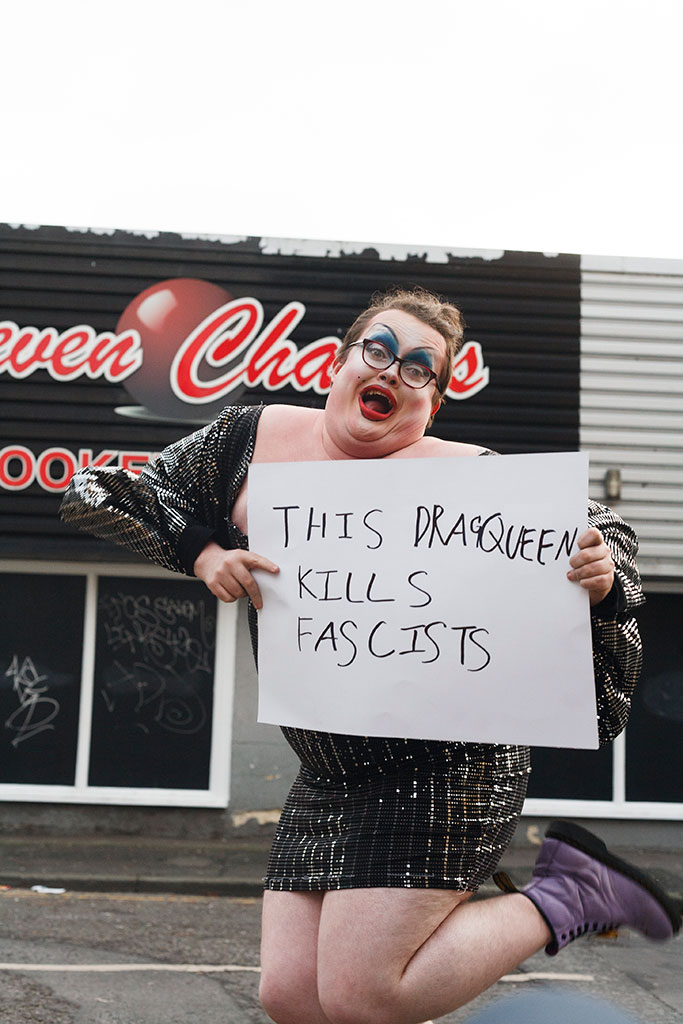
Marilyn Misandry
When asked to describe herself in three words, Misandry aptly responded “Fuck men always.” Yet this staunch anti-patriarchal rhetoric isn’t simply a symptom of her drag — it’s the foundations upon which it was built.
“I’m a self-identified gender terrorist,” she continued. “My work is very much about challenging and disrupting mainstream narratives in drag. It’s about being subversive and aggressive. It’s about transgression; fucking up spaces and changing them in ways you might not expect to happen.
“Hence why I created this look I like to call ‘These drag queens kills fascists.’ It’s a deliberately bold statement, and a reference to the amazing Woody Guthrie who, when asked what his guitar did, he replied ‘This machine kills fascists.’ He had that written on the back of his guitar.”
On why exactly she constructed this look in particular, Misandry described scenes at Glasgow Pride earlier this year where a number of activists had tried to block the police presence there, to challenge a group of fascists putting pressure on the event.
“As drag queens, we have to be social commentators. Drag has to have social commentary for it to work. And I think that’s more important now than ever. As queers, we’re now under attack by different kinds of fascism. You only have to look at Trump, Pence, the emergence of ISIS against queer people in the Middle East, Putin and his attack on queers in Russia and Chechnya, then over here in the UK we’re seeing this resurgence in ‘family values’ from people like Jacob Rees-Mogg, who’s foully right-wing.
“I wanted to create something that was going to have this immediate visual impact to challenge all of that. Our feeling was that we are drag queens, and we would kill fascists. There’s anger there.
“I try to bring my drag back to the queer-core idea that our art should reflect our reality, and our reality is often violence — especially when you’re trans. Our reality is often under threat, and so our drag should evolve to respond to that violent threat. I think the best way to respond to that violent threat is to respond militantly.”
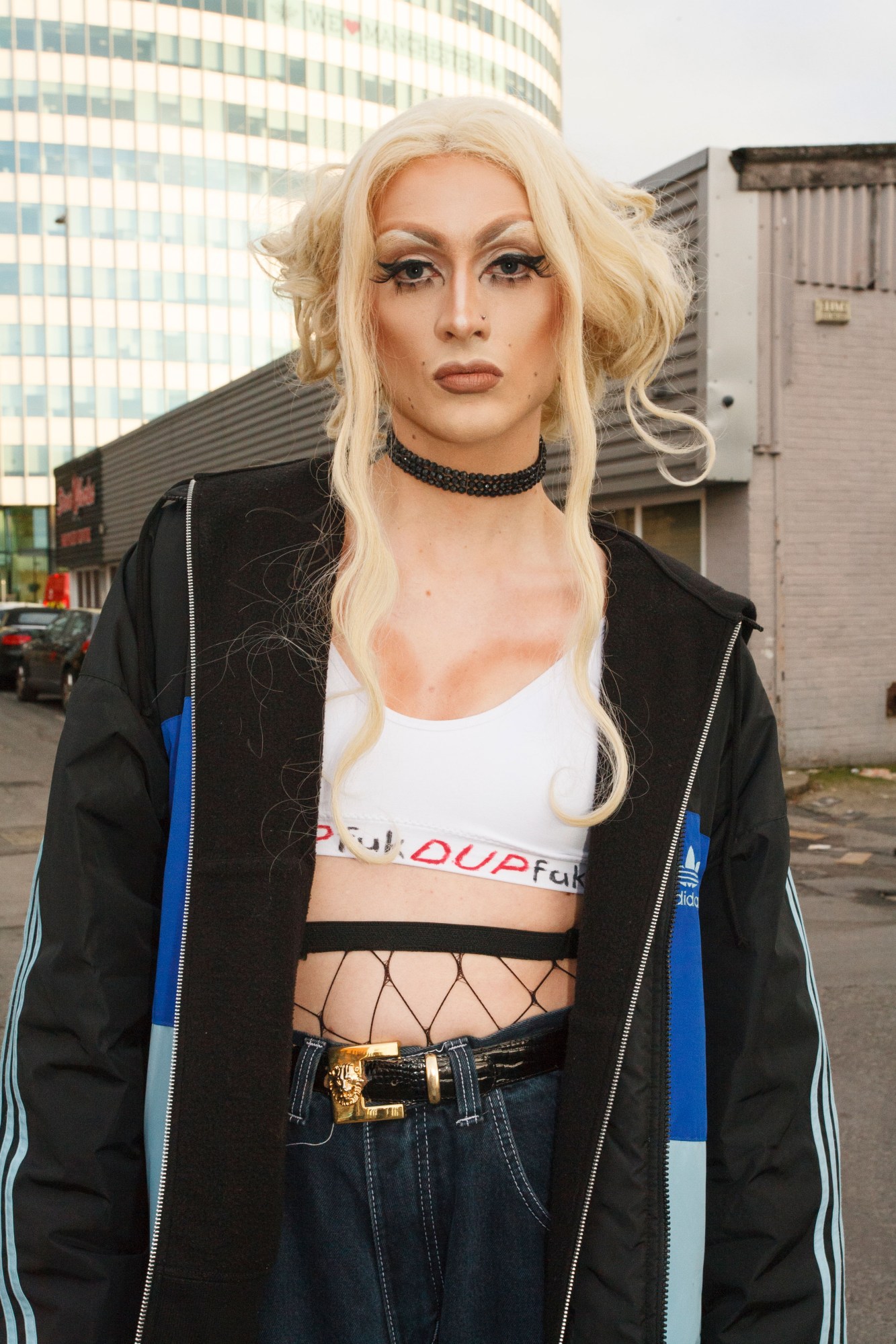
Monopoly Phonic
Monopoly Phonic tells a similar story but — as a drag queen-slash-musician — uses her self-produced tracks to challenge oppression in a way that’s uniquely hers.
Straight Acting is a fine example of that. It challenges that all too familiar attitude seen on Grindr, where people state they’re only looking for “straight-acting” guys to hook up with. It’s some sort of neo-McCarthyism against femmes, and utterly ridiculous.
“We have so much more freedom to be openly gay now,” states Phonic. “And that freedom was fought for by queer people at Stonewall and across the queer movement. They weren’t ‘straight-acting’ people. They were ‘sissies’, ‘fags’ and drag queens and they didn’t fight just so these straight-acting gays would have the freedom to go online and say they only want someone ‘masc’. It’s a slap in the face to that part of history.”
And when it comes to challenging domestic politics, Phonic is just as reluctant to keep quiet.
“I’ve put together a sports bra-type top, which I bought from T.K. Maxx because I’m not on a big budget [laughs]. There’s a lovely little slogan on there — which I wrote using sharpies — that says ‘Fuk DUP’, but sounds like ‘fucked up’ when read aloud.
“We’re all just feeling so hopeless and at the end of our tether with Brexit, Trump and the general election in June. We’re in a world now where young people especially have a lot of political anger. People feel like there’s not much they can do other than state their position by putting it all over social media. I’m pushing past that by incorporating it into my clothing.
“And that’s why I’ve targeted the Democratic Unionist Party in particular. They’re anti-abortion, they’ve got a terrible record on LGBT issues in Northern Ireland, and just the fact that the Conservatives — who aren’t much better themselves — have recently jumped into bed with them is so transparent. If it wasn’t so awful, it would be hilarious as to how much of a failure the last election was for the Tories.”
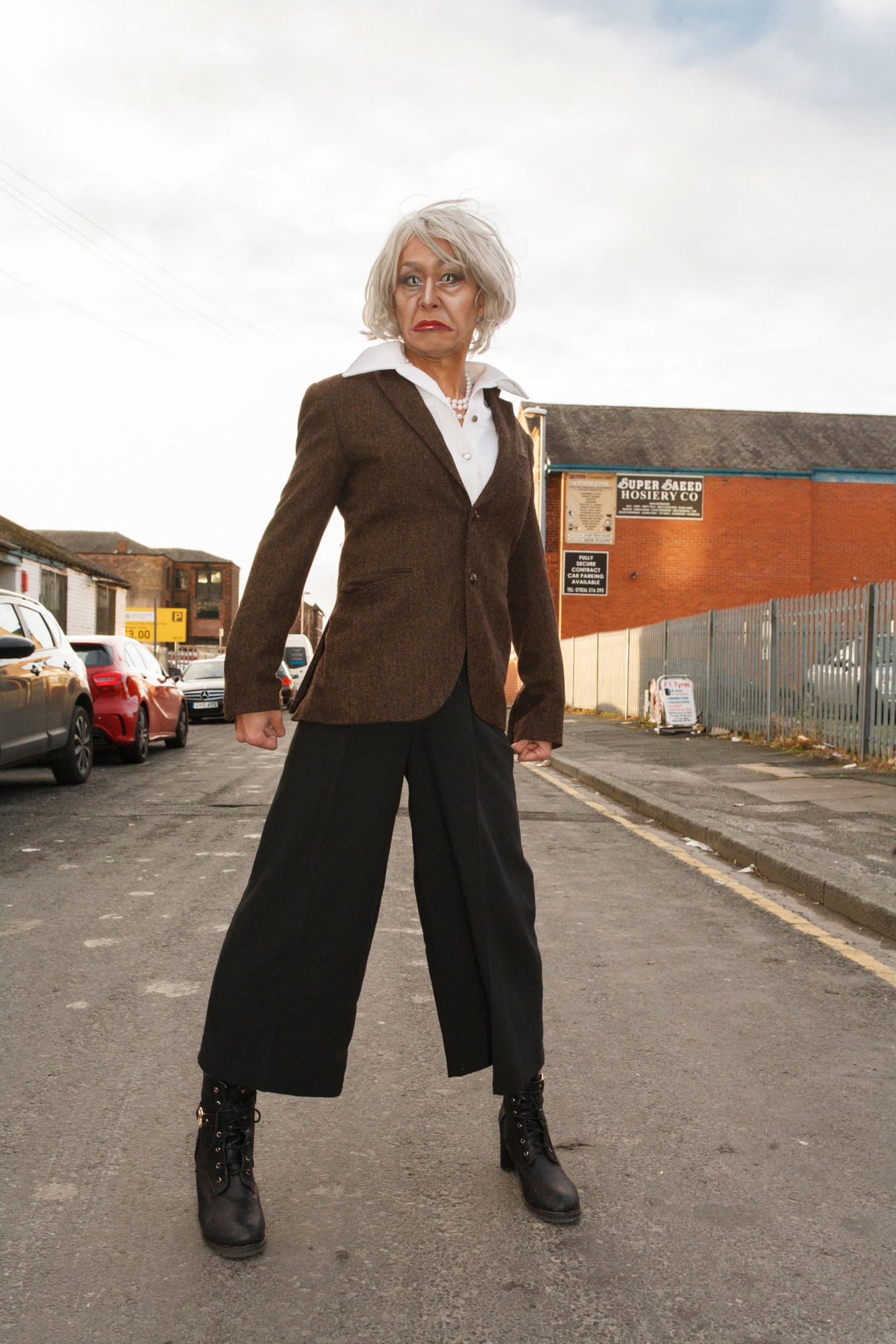
Eva Serration
If there’s anyone pushing their drag to perfectly represent the dark-but-farcical nature of the Conservative Party’s recent shortcomings, it’s Eva Serration — the vessel that brings us Theresa Dismay.
Her drag-queen-within-a-drag-queen is a “horrifying, scathing take on our Prime Minister”, and has been parodying all things “Strong and Stable” since the recent campaign — all in an effort to subvert May’s authority.
“What I do is accentuate lots of wrinkles, put grey everywhere, make my face whiter, pop my reptilian contact lenses in, grab my signature pearls and I’m done! Plus, her hair is always on the dishevelled side to reflect how tired she looks.
“Drag is a really healthy and irreverent way to discuss lots of important issues — especially politics. Talking about it in a serious way turns people off; they’d rather get away from it. But with my drag, I’m using low-brow entertainment to talk about high-brow ideas.”
This begs the question: do drag queens have a moral obligation to challenge social issues?
“Definitely! Just look at Marsha P Johnson — if she hadn’t been amongst the first to throw bricks at police at Stonewall, who knows where we’d be now? This has been recognised as such an iconic moment in our history, and that in itself shows queer people today that we don’t have to be pacifists and just accept the situation as it is.
“I’ve performed in competitions in the past where judges have told me my material is too political to be entertaining. Sure, people do come to drag shows to be entertained. But if the people involved in the Stonewall riots hadn’t forced society to pay attention, nobody would have started to engage. And if that was the case, the situation for the queer community could have stagnated or become even worse — and we can never allow that to happen.”
So it’s clear these queens are well aware of how far their freedoms have come, and are using that momentum to continue to push for total inclusivity. Yet, what they also have in common is an awareness of how dangerous it would be for the wider queer community to rest on their laurels, thinking that the struggle for total queer emancipation is over.
And if that means moving into an age of the audacious, politically active drag queen, you’ll find us right at their feet.
